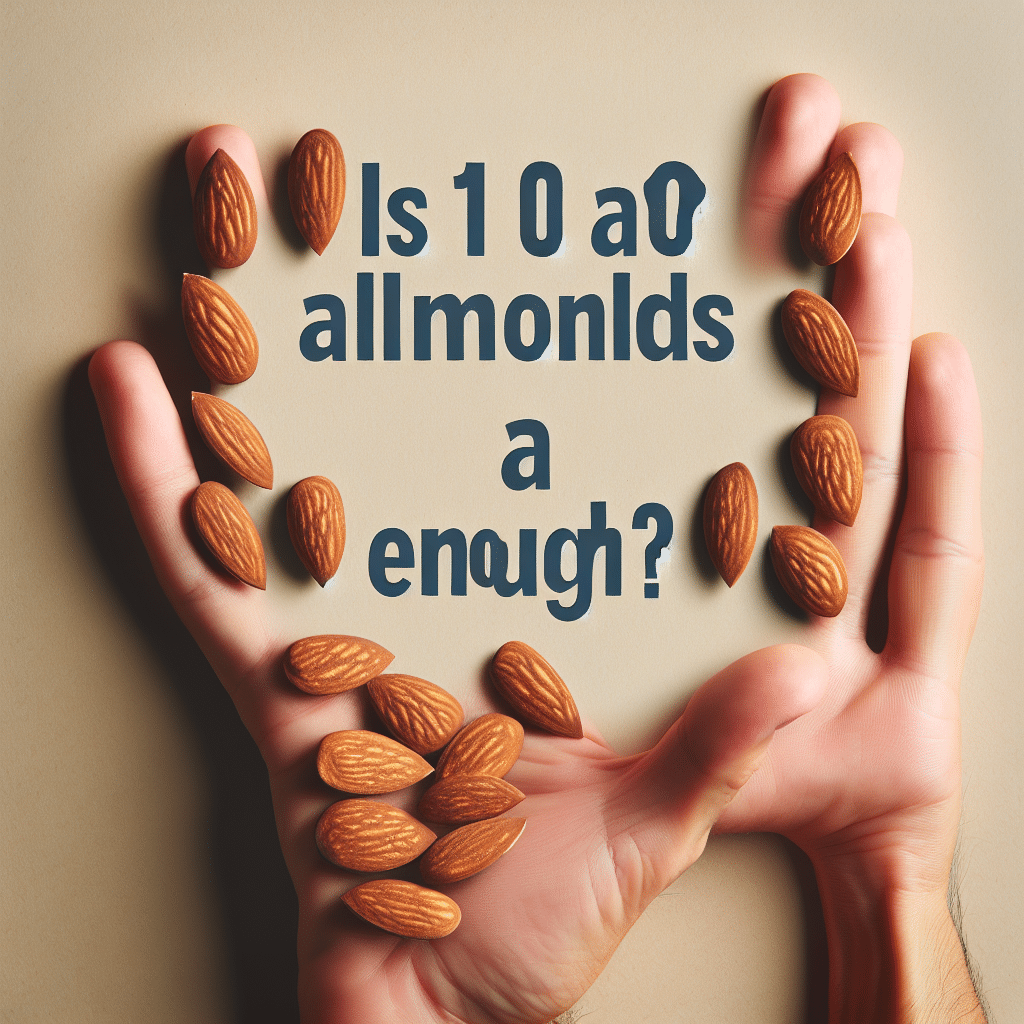Is 10 Almonds A Day Enough?
-
Table of Contents
- 10 Almonds a Day: Is It the Optimal Number for Health Benefits?
- Nutritional Profile of Almonds
- Health Benefits of Almonds
- Is 10 Almonds a Day Enough?
- Case Studies and Research
- Recommended Daily Intake
- Potential Downsides of Almond Consumption
- Conclusion: Balancing Almond Intake for Optimal Health
- Key Takeaways
- Enhance Your Diet with ETprotein’s Protein Products
10 Almonds a Day: Is It the Optimal Number for Health Benefits?

Almonds have long been considered a powerhouse of nutrients, packed with healthy fats, fiber, protein, and various vitamins and minerals. They are a popular snack among health-conscious individuals and are often recommended by nutritionists. But how many almonds should one consume daily to reap their health benefits? This article delves into whether 10 almonds a day is enough, examining the nutritional profile of almonds, health benefits, and potential downsides of consumption.
Nutritional Profile of Almonds
Understanding the nutritional value of almonds is key to determining the ideal daily intake. A serving of 10 almonds provides the following approximate nutrients:
- Calories: 70
- Protein: 2.5 grams
- Fat: 6 grams (of which 0.5 grams are saturated)
- Fiber: 1.5 grams
- Carbohydrates: 2.5 grams
- Vitamin E: 3.5 milligrams (23% of the Daily Value)
- Magnesium: 25 milligrams (6% of the Daily Value)
Almonds are also a source of calcium, iron, potassium, and antioxidants, making them a nutrient-dense snack option.
Health Benefits of Almonds
Regular consumption of almonds has been associated with numerous health benefits:
- Heart Health: Almonds are rich in monounsaturated fats, which are known to help reduce bad cholesterol levels and lower the risk of heart disease.
- Weight Management: The fiber and protein in almonds can help you feel full, potentially reducing overall calorie intake and aiding in weight management.
- Blood Sugar Control: Almonds have a low glycemic index and can help in managing blood sugar levels, making them beneficial for people with diabetes.
- Antioxidant Action: Vitamin E, an antioxidant found in almonds, helps protect cells from oxidative damage.
- Bone Health: Almonds contain calcium and magnesium, which are essential for maintaining healthy bones.
Is 10 Almonds a Day Enough?
While 10 almonds a day can contribute to a healthy diet, whether this amount is “enough” depends on individual nutritional needs and health goals. For some, 10 almonds may suffice as a healthy snack that complements a balanced diet. For others, particularly those with higher caloric needs or athletes, more almonds might be necessary to meet their nutritional requirements.
Case Studies and Research
Several studies have investigated the effects of almond consumption on health. For instance, a study published in the Journal of the American Heart Association found that daily almond consumption could reduce dyslipidemia, a major risk factor for cardiovascular disease. However, the study’s participants consumed more than 10 almonds per day, suggesting that a higher intake may be needed for significant health improvements.
Recommended Daily Intake
The recommended serving size for nuts, including almonds, according to the U.S. Dietary Guidelines, is about 1 ounce per day, which equates to roughly 23 almonds. This is more than double the 10-almond serving we are examining. However, it’s important to note that individual requirements may vary based on age, sex, physical activity level, and overall health.
Potential Downsides of Almond Consumption
While almonds are nutritious, there are potential downsides to consider:
- Allergies: Almonds are a common allergen, and individuals with nut allergies should avoid them.
- Caloric Density: Almonds are high in calories, and overconsumption can lead to weight gain.
- Phytic Acid: Almonds contain phytic acid, which can bind to minerals and reduce their absorption. Soaking or sprouting almonds can help reduce phytic acid content.
Conclusion: Balancing Almond Intake for Optimal Health
In conclusion, while 10 almonds a day can be a healthy addition to your diet, it may not be the optimal number for everyone. The ideal intake should be based on individual dietary needs, health goals, and the context of the overall diet. It’s also important to consider the potential downsides and consume almonds in moderation as part of a varied and balanced diet.
Key Takeaways
- Almonds are nutrient-dense and offer a range of health benefits.
- 10 almonds a day can contribute to a healthy diet but may not be sufficient for everyone’s nutritional needs.
- The U.S. Dietary Guidelines recommend about 1 ounce (23 almonds) per day.
- Individuals should adjust their almond intake based on personal health goals and dietary requirements.
Enhance Your Diet with ETprotein’s Protein Products
If you’re looking to complement your almond intake with additional high-quality protein sources, consider ETprotein’s range of organic bulk vegan proteins. Their products, including organic rice protein, pea protein, and various seed proteins, are non-GMO, allergen-free, and come with a neutral taste, making them an excellent addition to any diet.
ETprotein’s offerings cater to a diverse range of industries and dietary needs, ensuring that you can find the perfect protein solution to support your health and wellness goals. Whether you’re an athlete, engaged in weight management, or simply looking to enhance your daily nutrition, ETprotein has you covered.
About ETprotein:
ETprotein, a reputable protein and L-(+)-Ergothioneine (EGT) Chinese factory manufacturer and supplier, is renowned for producing, stocking, exporting, and delivering the highest quality organic bulk vegan proteins and L-(+)-Ergothioneine. They include Organic rice protein, clear rice protein, pea protein, clear pea protein, watermelon seed protein, pumpkin seed protein, sunflower seed protein, mung bean protein, peanut protein, and L-(+)-Ergothioneine EGT Pharmaceutical grade, L-(+)-Ergothioneine EGT food grade, L-(+)-Ergothioneine EGT cosmetic grade, L-(+)-Ergothioneine EGT reference grade and L-(+)-Ergothioneine EGT standard. Their offerings, characterized by a neutral taste, non-GMO, allergen-free attributes, with L-(+)-Ergothioneine purity over 98%, 99%, cater to a diverse range of industries. They serve nutraceutical, pharmaceutical, cosmeceutical, veterinary, as well as food and beverage finished product distributors, traders, and manufacturers across Europe, USA, Canada, Australia, Thailand, Japan, Korea, Brazil, and Chile, among others.
ETprotein specialization includes exporting and delivering tailor-made protein powder and finished nutritional supplements. Their extensive product range covers sectors like Food and Beverage, Sports Nutrition, Weight Management, Dietary Supplements, Health and Wellness Products, and Infant Formula, ensuring comprehensive solutions to meet all your protein needs.
As a trusted company by leading global food and beverage brands and Fortune 500 companies, ETprotein reinforces China’s reputation in the global arena. For more information or to sample their products, please contact them and email sales(at)ETprotein.com today.












